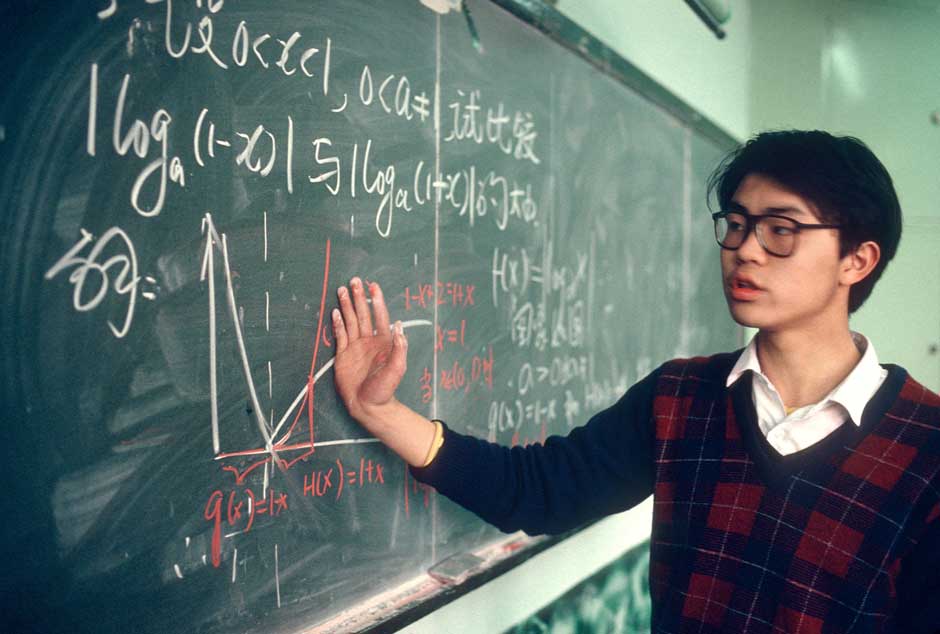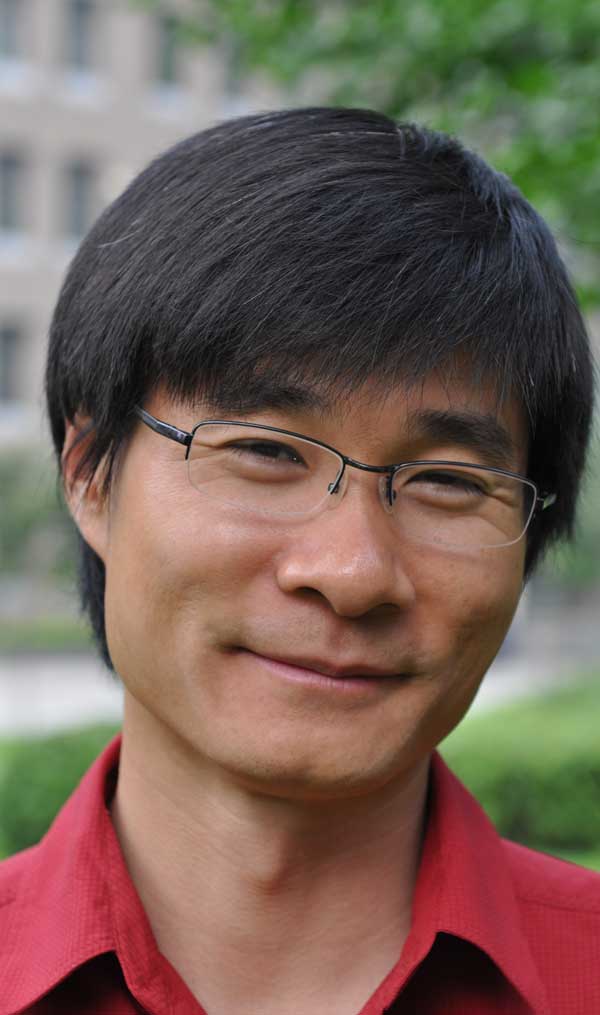In December, China stunned the world when the most widely used international education assessment revealed that Shanghai’s schools now outperform those of any other country—not only in math and science but also in reading. Some education experts have attributed these results to recent reforms undertaken by the Chinese government. Jiang Xueqin has been active in Chinese education since 1998, when as a Yale undergraduate he taught for six months at one of the top high schools in China, Beida Fuzhong, or the Affiliated High School of Peking University.
A Canadian citizen whose parents emigrated from China, Jiang, who is thirty-seven, helped establish an experimental high-school program in Shenzhen in 2008 and now works for Tsinghua Fuzhong, Tsinghua University’s Affiliated High School. He just published a book in China called Creative China about his experiences in Chinese public schools. I spoke to him in Beijing in late March about the future of education in China.
Ian Johnson: Why was there this desire for education reform in China?
Jiang Xueqin: Since the late 1990s, there has been a shift in how parents viewed the Chinese educational system. In 1999, when I taught in China, you could argue that the gaokao system [the rigorous testing system that controls who gets into which universities] was at its apex. The gaokao was a good way to produce engineers and mid-level bureaucrats. It was perfect for these goals because it filters out people with the highest analytical intelligence. China in the 1980s and 1990s was basically a sweatshop economy. It was about organizing the masses and producing Nike sneakers for the American market. Everyone believed that the best route to success was to do well on the gaokao, get a degree in China, and then go to the United States for graduate school.
But starting around 2004 and 2005, the middle class was rising, more people were going overseas and seeing other cultures. They began to question the validity of a gaokao education. If China is to progress, it needs people with different skill sets. It needs entrepreneurs, designers, managers—the sort of people China doesn’t have.
In 2008, you began working with Wang Zheng, a Chinese high-school administrator who was launching a new approach to education in the southern Chinese city of Shenzhen.
You know Shenzhen—it’s where economic and social reforms were pioneered so it’s a place that likes experimentation. Wang Zheng had a free hand to try different things there that couldn’t be done elsewhere. We wanted to broaden children’s education so they’re not just test-taking machines, be it for the gaokao or the SAT. That’s what the reforms Wang and I undertook were aimed at.
I had fifty students in my department and they didn’t take the gaokao. Instead, we set up a lending library. We also set up a school newspaper and a coffee shop. They read, wrote, and worked.
What was the idea behind the coffee shop?
I wanted kids to understand the complexities of being an entrepreneur and to learn empathy and service. As a waiter you have to think of what the needs of the customer are. It would compel the students to think about what other people needed. But these were rich Chinese kids and they didn’t know how to serve anyone but themselves. And the idea of labor? “No! My parents hire laborers.” You’re not supposed to use your hands because you’re an intellectual. This is an old prejudice in China. So they wanted to hire laborers to run the coffee shop. They just wanted to be the capitalists. It took work to change their minds.
We did other things too. We had them write more essays, do social service work, and travel as much as possible.
And you wanted to help them study abroad?
I grew up very poor in Toronto. My dad was a short-order cook in a restaurant and has been so for the past thirty-five, forty years. My mother is a seamstress who makes under the minimum wage. We didn’t have a car for the longest time. We didn’t know what it meant to go on vacation. When I went to Yale, other kids talked about their ski trips or going to exotic lands in Europe, that was completely remote from my own experience. I had spent my youth playing with a Lego set, watching TV, and reading books.
Going to Yale was liberating because I had a chance to change my life. But it was alienating. Yale tends to foster hyper-competitiveness. What I didn’t realize is that Yale is a gateway to power. People who go to Yale mostly come from a certain social class. They’ve been taught to think and behave in a certain way that allows them to climb the hierarchy in the United States. They have a lot of social skills and emotional intelligence that I didn’t have. They’re able to leverage their social network and use things like their charm, their charisma. They made the most out of Yale because they could expand their social network and could adapt a certain way of thinking that would help them later in life.
Advertisement
I did very well academically. I graduated with distinction in English. But I felt like a complete fraud. I felt I didn’t belong there and it made me really insecure. I didn’t understand my classmates. We weren’t thinking along the same lines.
And yet in Shenzhen you helped set up an international department at the high school that was designed to help Chinese kids get into universities like Yale.
I wanted to make them thoughtful individuals who would appreciate their education and be less focused on tests—I wanted to make them anti-me. But I wanted to get them into Ivy Leagues. What I didn’t realize is that these things are in conflict with each other. Getting into an Ivy League is just as stressful as going through the gaokao. The rigorous pressure a kid faces at Exeter or Thomas Jefferson is no different than that of a kid at Beida Fuzhong [the affiliated High School of Peking University where Jiang taught in the late 1990s] who is preparing for the gaokao. It’s a different system but it creates the same kind of super-ambitious kids.
In the United States there is a discussion about learning from the Chinese experience.
The reform movement in the US is led by a bunch of Ivy League people who are obsessed with data. They have allies in the media like Thomas Friedman and are bankrolled by billionaires like Bill Gates. They want to bring “accountability” to the American school system. That means testing. They use China as the Yellow Peril. “If our kids can’t do math, China is going to kick our ass. Our kids are going to end up as Chinese slaves.” The media loves it because fear sells.
But if you look at it really broadly, there’s little difference between how kids are raised in either country. Middle-class parents in both countries are trying to maintain their social standing and propagate it to the next generation. The Amy Chua complex. But Amy Chua is just being honest and direct. The way she raises her kids is no different from the way other upper-middle class parents raise their kids. They’re just more nuanced, subtle in the way they manage their kids: “We really care about your individuality. We really care about the choices you’ll make for yourself and we really want you to have a rich and diverse experience. But it would also be amazing if you went to Harvard and became a corporate lawyer.”
It sounds like the two countries are actually moving toward each other.
It is amazing to see it. You have this system in the US that’s great for elites but is not so great for everyone else. In China you have a country trying to create an elite system.
Does that mean China wants more Exeters and Thomas Jefferson High Schools?
The irony is when I came here I hated rich people. I thought the point of education is to help poor people become rich. But at the end of the day the rich are the trendsetters. They see more, they have more access to education. They’re willing to take risks that poor people aren’t able to. The reality is most of the children in our program in China have been children of the rich. Is it fair? It’s not fair, but the rich can create the political space to do this. They can say “we want our kids to prepare for undergraduate education in the United States, so exempt them from the gaokao”—which is what’s happened. So it’s elite, but it’s in this space that we can experiment.
And if Chinese high schools don’t do this, then the elite will just send their kids to high school in the United States.
In 2008, when I went to Shenzhen high school, 10 percent went abroad for their undergraduate degree. Now it’s more like 20 percent.
Besides a better education, part of it is capital flight. You have a Chinese economic elite who want to hedge their bets. That means sending their family and assets abroad. And this is leading to the next major trend: elite Chinese high schools in the United States. You have a lot of mediocre private high schools in the US that are staying afloat partially because of Chinese money. But a lot of parents don’t like the idea of sending their kids abroad to study with white kids who can’t do math. I know that sounds bad, but it’s true.
Advertisement
If the best Chinese students are going abroad to study, then Chinese universities will have to accept non-gaokao* students.*
You look at a place like Peking University or Tsinghua University—most of the kids come from wealthy backgrounds. To do well at the gaokao, you need a top-quality tutor, so a lot of it is how much money you have. You almost never have a kid who comes from a poor background and just studied really hard in school. So if your rich start studying abroad, outside the gaokao system, the only way to get them to return to China to study is to allow non-gaokao students to enroll. This won’t happen overnight—we’re talking a decade or two—but the signs are there.




